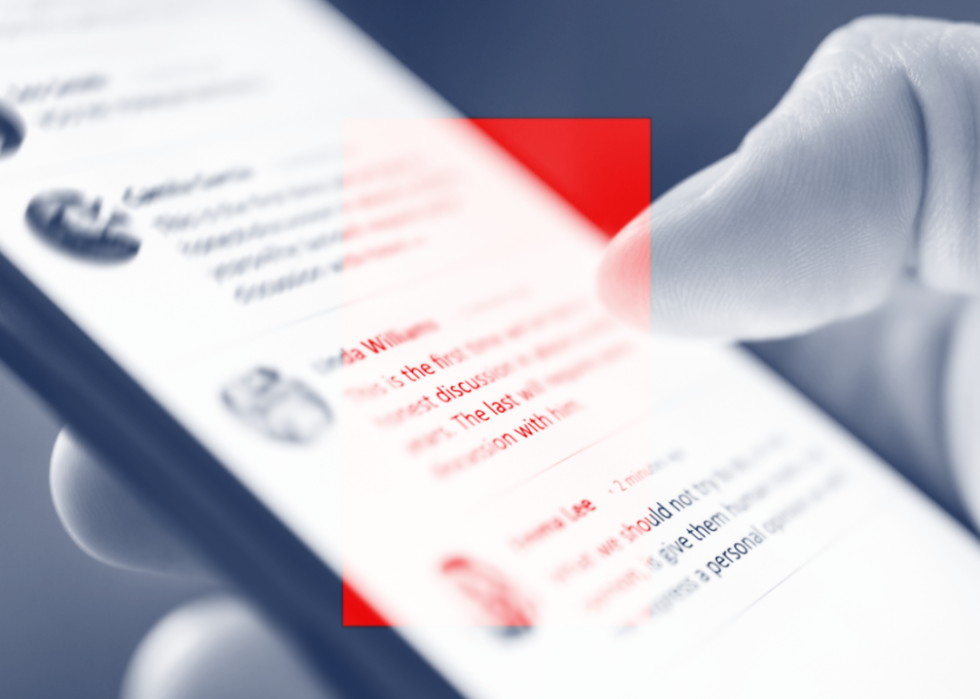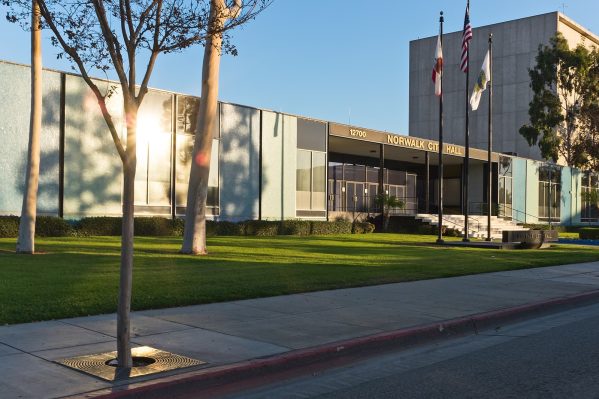“Biden’s plan exposed on the news. Illegals voting in 2024 election. Take the poll & get your Free Trump gift! #Trump2024,” a June advertisement on Facebook and Instagram from Patriot Sanctuary reads.
Accompanying the debunked statement that falsely implied President Joe Biden planned to have undocumented immigrants vote for him in the 2024 election is the Newsmax video where the claim originated and a call to action — take a poll and claim your free “In God We Trust” Trump hat and gold coin before they run out.
At the end of the poll, the user is prompted to enter credit card information on a page similar to other reported scams that promise free American flags and then make unsolicited charges to users’ cards.
As candidates ramp up messaging ahead of the election, both Democrats and Republicans are leaning into the influencer economy, pushing their messages about how each will lead the country if elected in November. But, another kind of influencer has been running ads on popular social networks and may have changed the way you think about political subjects without you even realizing it.
They’ve been dubbed “inauthentic influencers,” faceless networks of pages like Patriot Sanctuary entirely unaffiliated with legitimate political campaigns. They run paid advertisements to push misleading claims and, often, scams.
Collabstr analyzed the latest reports from the Institute for Democracy, Journalism and Citizenship‘s ElectionGraph project to illustrate how so-called inauthentic influencers have sought to manipulate the decisions of voters ahead of the 2024 presidential election.
IDJC partnered with analytics company Neo4j to analyze trends in the Facebook social graph — a map of the connections between pages, users, and personal information underlying social networks. The report draws on an analysis of advertisements run on Meta platforms, including Facebook and Instagram. It’s worth noting that Neo4j performed its analysis before Biden stepped down as the Democratic Party candidate.
Researchers described finding a “massive amount of manipulation and misinformation targeting Americans” through what it calls inauthentic influencers on social media platforms. These are not your typical influencers marketing cosmetics and sneakers. Instead, they’re networks of seemingly independent accounts with names like “Liberty Defender Group” and “Truly American” running nearly identical, coordinated political advertisements with no disclaimer.
In many cases, researchers found these networks pushing factually inaccurate and misleading claims as well as outright scams. Sometimes they’re linked by common credentials like phone numbers and addresses, connections that aren’t obvious to the users who see their ads in their feeds.

Inauthentic influencers potentially reach millions with manipulative content
Ultimately, the IDJC identified 158 networks of these accounts collectively representing $8.5 million in ad spending and 504 million impressions from September 2023 through April 2024.
An impression is a count of every time a post appears on a user’s screen while scrolling on a social network — whether or not they liked, shared, commented or interacted with it at all. It provides the broadest possible picture of the impact a single post may have had on users.
For comparison, the analytics service Databox estimates that the entire apparel and footwear industry achieved 460,000 impressions via Facebook ads in one month in 2023. If extrapolated over the period of the IDCJ study, that could amount to roughly 3.68 million impressions — a fraction of the more than 500 million impressions made by inauthentic influencers.
Researchers categorized pages according to independent reviews by team members, Google searches to determine political party affiliation, and the Ad Fontes media bias scale. The team found that conservative-leaning pages spent $2.1 million more on ads over the period studied and recorded 315.4 million more impressions than progressive-leaning pages. And accounts falling into these ideological categories targeted different groups of Meta users across Facebook and Instagram.

Targeting older users in highly populous and swing states
Those partisan pages were equally likely to target older users over younger ones with their posts, but there were differences in the gender of users targeted. Researchers drew a parallel between how progressive pages aligned with national political trends in targeting more women with their ads than men and how conservative-leaning pages targeted men more heavily.
The ads tended to push misleading information about different topics based on their ideological leanings, too. Among conservative influencer networks identified, immigration, the economy, safety and foreign policy were the top issues. For progressive pages, the economy was an important issue, too, along with health and social issues, including abortion access, according to researchers.

MAGA swag and health benefits scams
Aside from Donald Trump-related swag and financial scams from conservative-leaning pages, researchers found that progressive-leaning pages also commonly pushed health benefits-related scams to users they targeted with ads.
Facebook has since shut down the Patriot Sanctuary page and others identified in research from the IDJC, which makes its database of political ads on Meta available publicly. Researchers warn, however, that when one page is closed, another tends to pop up in its place.
Data from Meta also paints an incomplete picture of the networks of dishonest actors that could be working to fleece concerned citizens and manipulate voters. The company is the only major ad platform or social network that allows approved organizations access to its advertising data for study. Social networks, including X, formerly known as Twitter, and TikTok, do not offer the same access.
“It underscores that tech platforms need to do more to allow academics and journalists access to platform data so that political actors can be held to account with the American public,” lead researcher Jennifer Stromer-Galley said in a statement.
Written by Dom DiFurio. Story editing by Carren Jao. Additional editing by Kelly Glass. Copy editing by Kristen Wegrzyn.
This story originally appeared on Collabstr and was produced and distributed in partnership with Stacker Studio. The article was copy edited and retitled from its original version.
Re-published with CC BY-NC 4.0 License.







